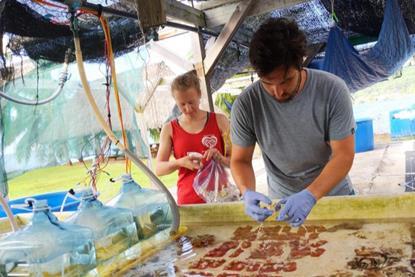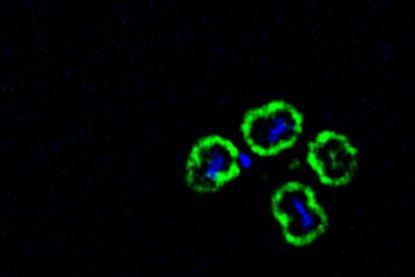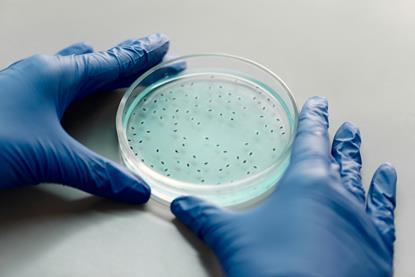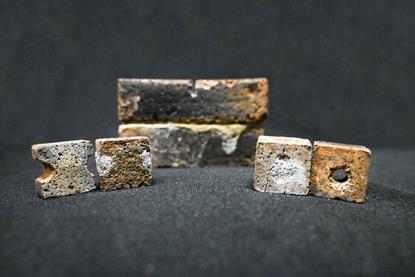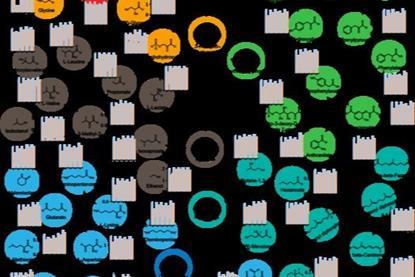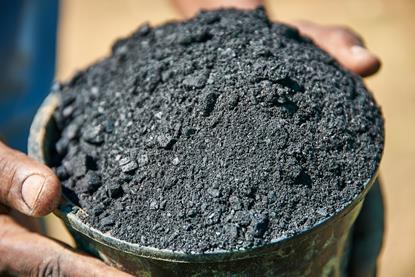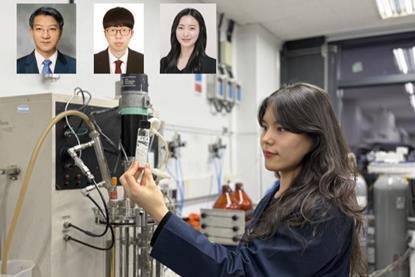Climate action
Today we are seeing climate change in action, increased concentrations of atmospheric greenhouse gases have led to a rise in sea levels, temperatures, and extreme weather patterns. Researchers have acknowledged the pivotal role microorganisms in producing sustainable biofuels, increasing carbon sequestration via soil microbes and reducing methane emissions in landfill sites. Microbial innovation will be vital in moving towards a low carbon economy.
News
Microorganisms employ a secret weapon during metabolism
Microorganisms have evolved a variety of methods for fixing carbon. Researchers investigated the methods that are utilized at extremely hot, acidic and sulfur-rich hydrothermal vents in shallow waters off the island of Kueishantao, Taiwan.
Read story- News
Living fungus-based building material repairs itself for over a month
Engineers have developed a building material that uses the root-like mycelium of a fungus and bacteria cells. They show that it is capable of self-repairing and could eventually offer a sustainable alternative for high-emission building materials like concrete.
- News
Oropouche virus infections underestimated in Latin America and likely to increase due to climate factors
Environmental factors, such changing temperatures and rainfall, are the main drivers associated with the spread of Oropouche virus (OROV) in Latin America, according to a modelling study.
- News
Deadly rodent-borne hantavirus is an emerging disease with pandemic potential
Researchers have found three hotspots of hantavirus circulation in wildlife in the US – Virginia, Colorado, and Texas – and identified 15 rodent species as carriers, including six species that had not previously been identified as hosts of the virus.
More Climate change
News
Dogs could help predict valley fever spread in humans
Valley fever, or coccidioidomycosis, is caused by a fungus that thrives in moist soils and becomes airborne during drought. In a new study, researchers show that dogs, who are also susceptible to the disease, can help us understand its spread.
- News
Coral reefs exude myriad chemicals, fueling dynamic microbial recycling of nutrients
New research reveals the remarkable chemical diversity of substances exuded by coral reefs and demonstrates that thousands of different chemicals derived from tropical corals and seaweeds are available for microbes to decompose and utilize.
- News
In Croatia’s freshwater lakes, selfish bacteria hoard nutrients, shaping food webs
Researchers have documented ’selfish polysaccharide uptake’ by bacteria in freshwater ecosystems for the first time. They found that nutrient hoarding allows selfish species to dominate over others, which could shape a lake’s food web.
- News
AFYREN strengthens its Executive Committee with appointment of Laurent Pou as Industrial Director
AFYREN, a greentech company offering manufacturers biobased, low-carbon ingredients through a unique fermentation technology based on a circular model, has announced the appointment of Laurent Pou as Industrial Director.
- News
With new database, researchers may be able to predict rare milky seas bioluminescent, glowing event
Researchers have compiled a database of sightings of bioluminescent ‘milky seas’, showing that sightings usually happen around the Arabian Sea and Southeast Asian waters and are statistically related to the Indian Ocean Dipole and El Niño Southern Oscillation.
- News
Scientists blame climate change for spread of infectious diseases and unleashing of ice-locked microbes in Arctic
Climate change is creating new pathways for the spread of infectious diseases like brucellosis, tularemia, or E. coli in the Arctic, according to a broad international consortium of scientists.
- News
The new season of The Last of Us has a spore-ting chance at realism
The trailer for the hit HBO series appears to show the ’zombie fungus’ cordyceps infecting humans by releasing air-borne spores, instead of through tentacles — closer to scientific reality, according to experts.
- News
Molecular clock analysis shows bacteria used oxygen long before widespread photosynthesis
Researchers have constructed a detailed timeline for bacterial evolution and oxygen adaptation. Their findings suggest some bacteria could use trace oxygen long before evolving the ability to produce it through photosynthesis.
- News
Scientists create ‘fungi tiles’ with elephant skin texture to cool buildings
Scientists have developed ‘fungi tiles’ that could one day help to bring the heat down in buildings without consuming energy. These tiles have bumpy, wrinkly texture to the tile, mimicking an elephant’s ability to regulate heat from its skin.
- News
Bacteria deployed to fix cracks in space bricks
Researchers have developed a bacteria-based technique to repair bricks that can be used to build lunar habitats, if they get damaged in the moon’s harsh environment.
- News
Microalgae and bacteria team up to convert CO2 into useful products
Most methods of genetically modifying the bacterium Escherichia coli and other microbes to convert carbon dioxide into useful biological products require additional carbon sources. A new study overcomes this limitation by combining the photosynthetic finesse of a single-celled algae with the production capabilities of the bacteria E. coli.
- News
Scientists devise comprehensive resource on microbial cell factories for sustainable chemical production
Scientists evaluated the production capabilities of various industrial microbial cell factories using in silico simulations and, based on these findings, identified the most suitable microbial strains for producing specific chemicals as well as optimal metabolic engineering strategies.
- News
Inter-trophic networks reveal the central role of methanogens in deposited estuarine soils
A new study focused on exploring the distribution patterns, driving factors and microbial interaction patterns of methane-metabolizing microorganisms along the sedimentation gradient in the Yellow River estuary.
- News
Soil carbon-degrading enzyme activities more sensitive to warming in alpine meadow than swamp meadow
A new study demonstrates that the activities of soil extracellular enzymes are significantly altered in the alpine meadow, but not significantly in the swamp meadow, which coincided with the soil organic carbon content of these grasslands.
- News
Microbiologists must seize the day - and make their mark on policy
Microbiologists need to seize opportunities to engage with policymaking in order to move towards better, more scientifically informed policy that serves the common good, a new paper published in Sustainable Microbiology urges.
- News
AMI members show the way on how microbes are already solving environmental disasters
Applied Microbiology International members are among a team of high level microbiologists who have teamed up to highlight how the world’s tiniest creatures are delivering solutions to climate change and pollution.
- News
Distinct patterns of soil bacterial and fungal communities in the treeline ecotone
A study was carried out to understand the biodiversity of the microbial communities in the treeline ecotone that might affect alpine ecosystems and other potential ecological effects in response to climate change.
- News
Biochar and microbe synergy: a path to climate-smart farming
Researchers conducted a global analysis to obtain a full picture of the environmental and agricultural benefits of biochar, which is shown to be beneficial to soil health and microbes.
- News
Scientists develop eco-friendly, nylon-like plastic using microorganisms
Scientists have developed microbial strains through systems metabolic engineering to produce various eco-friendly, bio-based poly(ester amide)s from glucose derived from biomass sources such as waste wood and weeds.





